Did you know that some foods can mess with your medicines? This can happen even with everyday foods like grapefruit or coffee. It is important to avoid such food-drug interactions to prevent any adverse events and maintain the effectiveness of the medicine1.
In this article, we’ll discuss about the food interactions which can occur with the drug, metformin. Metformin is a common medicine prescribed for the management of Type 2 Diabetes. We’ll talk about Metformin’s intricate relationship with foods, when to take it, and more2.
Did you know?
Metformin is a drug that helps bring down your blood sugar levels. It is mainly used to manage Type 2 diabetes3.
Metformin is available in different doses and forms. These include tablets, oral solutions, and even extended-release tablets. Your doctor will prescribe the right form and dosage based on your health condition and lifestyle.
Mostly, Metformin is stored at room temperature. It should be placed away from moisture or heat. Also, keep it out of reach of children.
Metformin mainly works by reducing glucose production by the liver. By doing so, it helps lower overall blood sugar levels. It also improves the body’s response to insulin and helps cells use insulin better, making it easier for them to take in glucose from the blood4,5. If you have type 2 diabetes, your healthcare provider may prescribe Metformin.
Certain food items and alcohol can affect Metformin’s effects6,7. We will discuss this in detail in the coming sections.
In my experience, I have observed that use of metformin might lead to vitamin B12 deficiency. It is important to be aware of the potential risk and consider regular monitoring of your vitamin B12 levels, as well as discussing the need for supplementation with your healthcare provider13.
Dr. Siddharth Gupta, BAMS, MD (Ayu)
Food choices play a big role in managing type 2 diabetes. While they don’t directly counteract Metformin’s actions, overeating or bad food choices can increase its efforts to control blood sugar.

Certain foods can get in the way of Metformin. These are processed carbohydrates, saturated fats, trans fats, and too much sodium. While not opposing Metformin directly, they can spike up your glucose and insulin levels.
Detailed list of Foods to Avoid
Saturated fats can also make you more insulin resistant, which can make weight loss and blood sugar management more difficult. Fatty foods can delay gastric emptying and contribute to, prolonged postprandial hyperglycaemia (high blood sugar levels after food), which can be problematic over the long term. Sodium does not directly affect blood glucose or Metformin, but it increases cardiovascular risk and blood pressure, which are comorbid concerns in diabetes8. Also, some studies6 have found that a high-fat, high-calorie diet can slow the absorption of metformin.
So, although these foods don’t directly interfere with Metformin’s pharmacologic action, they can oppose its intended effect by raising blood glucose levels, adding to Metformin’s workload.

Some foods can make it hard for Metformin to work. Yet, some others support Metformin’s actions. These are complex carbohydrates, healthy fats, fibre, lean proteins, and select fruits and vegetables9.
Detailed List of Beneficial Foods
Consuming these foods along with Metformin can support your blood sugar balance. Plus, it can help keep your weight in check. But please note that not all fruits are low glycaemic. Portion control and glycaemic index should be considered especially if you are diabetic. Your doctor can guide you best on what type of foods you can eat based on your blood sugar control.
Based on my experience, I have found that metformin typically does not cause low blood sugar (hypoglycaemia) when taken alone. However, it is important to be cautious when combining metformin with other diabetes medications like insulin or gliclazide, as these combinations may increase the risk of hypoglycaemia13.
Dr Rajeev Singh,BAMS
Food choices matter a lot in diabetes, especially if they interact with drugs like Metformin. Here are some specific food items that can affect metformin.
Grapefruits are beneficial but found to interact with many drugs including Metformin. An old study on non-diabetic rats showed grapefruit juice might trigger a potentially fatal condition called lactic acidosis when mixed with Metformin10. Lactic acidosis is a rare but serious side effect of metformin, typically in patients with renal impairment or other risk factors.
Grapefruit inhibits CYP3A4 enzymes, affecting drugs metabolized by this pathway (e.g., statins, calcium channel blockers). However, Metformin is not significantly metabolised by CYP enzymes, including CYP3A4. So, this seems to be an overemphasised claim. Yet, we don’t have any human case studies indicating a similar reaction with Metformin and grapefruit so far. More research is needed here.
Alcohol consumption may also interact with Metformin’s action. Taking alcohol and Metformin together may cause lactic acidosis, a rare but serious condition7. Still, this could happen only if you drink alcohol heavily and regularly. It can also swing your blood glucose levels both ways – high (hyperglycaemia) and low (hypoglycaemia). Moderate drinking usually isn’t problematic unless you have kidney or liver issues. (Note that moderation as per guidelines is termed as no more than one drink per day, for women, and for men, a moderate amount is no more than two drinks per day.)
Drinking alcohol regularly can also exacerbate kidney and liver issues, so talk with your doctor if you suffer from non-alcoholic liver disease or kidney disease before consuming alcohol with Metformin.
Wondering how to take metformin the right way? Let’s see how and when to take Metformin for best results.
When taking Metformin, timing is important for minimizing side effects (like GI upset) and optimizing blood glucose control. Normally, immediate-release tabs are taken twice a day while extended-release tabs are taken once daily. Keeping to this schedule helps manage diabetes effectively.
Taking Metformin with meals can cut down its side effects like gas, bloating, nausea, and diarrhoea. Extended-release Metformin is usually taken with the evening meal to reduce gastrointestinal side effects and enhance overnight control.
Metformin, a widely prescribed medication for managing Type 2 diabetes, offers significant benefits, but users should be aware of potential side effects. Commonly reported metformin side effects include gastrointestinal symptoms like nausea, diarrhoea, and abdominal discomfort, although these often subside with continued use.
Continued use often leads to a gradual diminishment of these symptoms.
Metformin Side Effects in Females:
Metformin Side Effects in Males:
If your health changes or you spot signs like muscle pain, feeling tired, abdominal complaints, uneven heartbeats, or problems in breathing, get immediate medical help. These could be early signs of lactic acidosis. It’s a serious but rare side effect of Metformin.
Also Read: Pantoprazole Foods to Avoid
When taking metformin for PCOS, it’s advisable to be mindful of certain foods. Limiting high-carbohydrate and sugary foods can enhance its effectiveness. Avoid excessive alcohol consumption and consider reducing intake of processed foods. Incorporating a balanced diet with whole grains, fruits, and vegetables is beneficial. Consulting with a healthcare professional for personalized dietary recommendations is essential for optimal PCOS management with metformin.
Another interesting aspect of Metformin is its effect on body weight. Over time, people using Metformin have reported a slight weight loss. But remember, this isn’t guaranteed for all users.
Researchers have noticed a link between Metformin and weight loss, which might be due to reduced hunger cues12. However, metformin’s weight loss effect is thought to be multifactorial, including improved insulin sensitivity, decreased hepatic glucose production, possible mild appetite suppression, and effects on gut hormones like GLP-1. But keep in mind, weight management isn’t only about medicine. It’s also about eating healthy and exercising regularly.
Long-term weight loss linked with Metformin varies from person to person and may not be as much as you’d want. An average drop of around six pounds after a year of treatment is seen. To kickstart and keep up the weight loss, diet tweaks and exercise are crucial elements as well.
Simply put, no. Metformin is specially made for patients with Type 2 diabetes. Though it has shown results in helping non-diabetic obese patients lose weight, this is an ‘off-label’ use and not approved by the FDA for non-diabetics. However, metformin is sometimes used off-label in PCOS and prediabetes with some evidence of benefit.
Also Read: What To Eat During Food Poisoning?
Dealing with food-drug interactions can be hard. However, understanding your body’s specific reactions can help keep good health and make your medication work best.
In short, matching wise food habits with Metformin can boost its effects in controlling Type 2 diabetes while making the wrong choices can increase its workload. Often, it’s about learning the potential interactions and making small food swaps in our daily meals. If you have diabetes, it’s best to discuss with your doctor and design the best diet plan that is suitable for your condition and does not impact your medications.
Moreover, simple things like watching your salt intake, staying hydrated, and exercising regularly can have a beneficial impact on your overall health. Remember, tiny tweaks in your diet and lifestyle can yield big health gains over time!
Also Read: 12 Foods That Are Necessary For A Healthy Liver!
As of now, there’s not enough proof to say coffee messes up Metformin. But remember, too much of caffeinated drinks might cause hydration issues. So, drink moderately.
Metformin may cause nausea, and if you also take insulin, Metformin can cause low blood sugar levels. This can be dangerous if you’re unable to keep liquids down, so call your doctor immediately if this is the case and you’re having trouble treating low blood sugars.
There are no adequate studies in women for determining infant risk when using this medication during breastfeeding. However, studies have shown that Metformin passes into breast milk in very low amounts but is generally considered compatible with breastfeeding. The American Academy of Paediatrics (AAP) and other authorities regard Metformin as usually safe during lactation. However, consult a doctor who will weigh the potential benefits against the potential risks before prescribing this medication while breastfeeding.
You may notice improvement in your blood glucose control in 1 to 2 weeks, but the full effect of blood glucose control may take up to 2 to 3 months. Ask your doctor if you have any questions about this.
Health pros suggest a low-carb, high-protein breakfast might work well with Metformin. Think eggs, lean meats, whole grains, and fresh fruits. It gives you main nutrients, lowers glycaemic spikes, and keeps you full till lunchtime.
Metformin-induced diarrhoea is thought to result from its impact on the gastrointestinal tract, causing increased fluid secretion and alterations in gut motility. Metformin increases intestinal glucose and bile acid concentrations, which can cause osmotic effects leading to increased fluid retention in the bowel. It may also alter gut microbiota and serotonin pathways affecting motility. Consultation with a healthcare professional is recommended for those experiencing persistent or severe diarrhoea while using metformin.
Metformin typically does not cause hypoglycaemia (low blood sugar) when used as a monotherapy. However, in combination with other diabetes medications that can lower blood sugar, there may be a higher risk of hypoglycaemia. It’s essential to follow healthcare provider guidance and monitor blood sugar levels regularly.
Metformin is occasionally prescribed during pregnancy for gestational diabetes but should only be used under the guidance of a healthcare professional. Individual health considerations and potential risks to the mother and foetus need to be carefully evaluated before making any decisions about medication during pregnancy.
While metformin is generally considered safe for the kidneys, there’s a rare risk of lactic acidosis, a serious condition. It’s crucial for individuals with kidney issues to consult with a healthcare professional to determine the appropriateness of metformin and to monitor kidney function regularly.
Yes, metformin is known to reduce insulin resistance, a key factor in type 2 diabetes. It improves insulin sensitivity, allowing cells to better respond to insulin and promoting better regulation of blood sugar levels.
No, metformin is not habit-forming. It is an oral medication commonly prescribed to manage type 2 diabetes and does not possess addictive properties. Always follow your healthcare professional’s guidance on medication use.
Metformin for prediabetes can be effective in slowing or preventing the progression from prediabetes to diabetes. However, individual responses vary, and it’s essential to consult with a healthcare professional for personalized advice on its use and to incorporate lifestyle changes for comprehensive prediabetes management.
Stopping metformin suddenly can mess with your blood sugar. Always talk to your doctor before making any changes to your medication, so they can help you do it the right way.
Metformin is generally considered safe for the liver, but in rare cases, it may cause an increase in liver enzymes. Regular monitoring and consultation with a healthcare professional are recommended to ensure the medication’s safety and address any potential concerns.
Signs that metformin is working include stable blood sugar levels, better insulin sensitivity, and reduced symptoms related to the medical condition. Regular check-ups with a healthcare professional help track and confirm its effectiveness for each individual.
Disclaimer: The information provided here is for educational/awareness purposes only and is not intended to be a substitute for medical treatment by a healthcare professional and should not be relied upon to diagnose or treat any medical condition. The reader should consult a registered medical practitioner to determine the appropriateness of the information and before consuming any medication. PharmEasy does not provide any guarantee or warranty (express or implied) regarding the accuracy, adequacy, completeness, legality, reliability or usefulness of the information; and disclaims any liability arising thereof.
Do you wonder what duloxetine is? Duloxetine belongs to the serotonin-norepinephrine reuptake inhibitors (SNRIs) class of drugs and is used in the management of mental health conditions like major depressive disorder (MDD) and generalised anxiety disorder (GAD) and other conditions like diabetic neuropathy1, fibromyalgia2, and chronic musculoskeletal pain. For individuals on duloxetine, it is vital to know about food and drug interactions of the medication and its side effects as these factors may influence the effectiveness of the medicine3.
Before exploring which foods and substances to avoid when on duloxetine, let’s first understand how the medicine works and its interactions with other drugs, supplements and herbal products along with other considerations. Each person responds differently to a medicine, so you should consult your doctor before making any major changes to your medicine.
Duloxetine works by increasing the levels of serotonin and norepinephrine in the brain. These are important chemicals that affect mood and pain sensations. Duloxetine does not let these chemicals be reabsorbed, allowing them to stay active in the spaces between nerve cells.
This action helps improve communication between nerve cells, influencing mood positively and reducing the perception of pain signals. Essentially, duloxetine’s role is to enhance the effects of serotonin and norepinephrine, making it effective in treating conditions like major depressive disorder, generalised anxiety disorder, and certain types of chronic pain. Individual responses to the drug may vary; therefore, it’s essential for individuals to consult their doctor for personalised information and guidance regarding duloxetine uses.
Did you know?
If you’re on duloxetine, some foods and drinks are best avoided. Here’s some foods you should watch out for.

It is safer to avoid alcohol if you are on duloxetine as the combination may increase some side effects of the drug and may lead to potentially harmful interactions. Both alcohol and duloxetine can cause CNS depression, potentially leading to excessive sedation. Alcohol may also interfere with duloxetine’s ability to improve mood, reducing its therapeutic benefit. Additionally, since both are metabolised in the liver, using them together increases the risk of liver toxicity4.
Taking alcohol with duloxetine could cause:
Both the manufacturer (FDA label) and doctors strongly recommend limiting or avoiding alcohol, particularly if you have a history of liver disease or depression. Always check with your doctor before consuming alcohol during duloxetine treatment4.
I want to emphasise that when prescribed to take duloxetine, it is important to especially avoid drinking alcohol as it may potentially increase the risk of liver damage. Prioritising your health and adhering to your doctor’s recommendations will ensure the safest and most beneficial use of this medication.
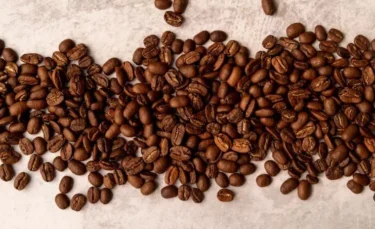
Keep an eye on your caffeine intake while taking duloxetine. Although caffeine doesn’t directly interfere with how the medicine works, it may worsen certain side effects, such as jitteriness, anxiety, or trouble sleeping, especially if you’re sensitive to stimulants. In some cases, too much caffeine may reduce duloxetine’s calming benefits by increasing restlessness or anxious feelings5.
To manage your caffeine intake:

Although duloxetine is not a monoamine oxidase inhibitor (MAOI), some people worry about its interaction with high-tyramine foods. However, current research has not shown any significant risk, and duloxetine does not inhibit the MAO enzyme. That said, if you want to be cautious, it’s you may limit foods high in tyramine, such as:
If you are curious to know the drugs that may not work well with duloxetine, let’s find out. Always inform your doctor about all the medicines, supplements, or herbal products you currently take or are planning to take, to help avoid any possible interactions.
Taking duloxetine with other medicines for mental health issues may increase side effects or cause complications.
Some examples of such medicines include:
How to manage drug interactions?
Here are a few simple precautions to help manage drug interactions while on duloxetine:
NSAIDs could increase the risk of gastrointestinal bleeding when used with duloxetine, which could lead to:
How to manage this interaction?
Here are a few precautions to manage the interaction of NSAIDs with duloxetine:
Combining amphetamines with duloxetine may lead to side effects like:
How to manage this interaction?
These precautions may help you manage the interactions of amphetamines with duloxetine:
You need to know how supplements and herbs can interact with duloxetine. So, always discuss all supplement and herbal product use with your doctor7.
There are no specific reported interactions between duloxetine and most vitamins or minerals. However, it’s still important to inform your doctor about any supplements you take, as certain combinations may affect how well the medicine works.
Some herbal supplements may not be safe to take with duloxetine. For example, combining St. John’s Wort with duloxetine may increase the risk of serotonin syndrome, a potentially serious condition linked to excess serotonin in the body6. Kava, another herbal product, may increase the risk of liver damage when taken with duloxetine. While there is no strong evidence that these herbs reduce the effectiveness of duloxetine, they can increase its side effects or lead to harmful interactions.
Some tips on safe herbal usage:
If you feel nauseous or unwell while taking duloxetine, it is advisable to avoid heavy meals and spicy or greasy foods. Easily digestible foods can reduce stomach discomfort and make you feel more at ease. Always let your doctor know if your nausea persists or worsens.
Certain factors like an individual’s vaccination status, laboratory test requirements, and health history can influence the effect of duloxetine.
Based on available data, there are no known interactions between duloxetine and most vaccines. However, it is advisable to consult your doctor before taking a vaccine if you are on duloxetine.
Duloxetine is not known to interfere with common lab test results. However, if you have been scheduled for any tests, let your doctor know you are taking duloxetine for better interpretation of your test results.
Your past and present health conditions can influence the effect of duloxetine. It is advisable to share your full medical history with your doctor, especially if you are pregnant or plan to conceive or have or have had:
Also Read: 12 Foods That Are Necessary For A Healthy Liver!
Some duloxetine side effects may specifically affect women and may vary from person to person:
Duloxetine may lead to certain side effects that are more commonly seen in men:
If you experience any of these symptoms, it is essential to consult your doctor and discuss your concerns openly.
Duloxetine may affect sexual health in both men and women. These effects can vary but may include:
Also Read: What To Eat During Food Poisoning?
Understanding how duloxetine may interact with certain foods, beverages, drugs and more supports better health and more effective use of the medication. It is important to consider your overall health and lifestyle when taking medication.
While on duloxetine, it is recommended you stay in touch with your doctor. Always share details of other medications and supplements you are taking with your doctor as they can influence your treatment. This allows your doctor to check for possible interactions, devise coping strategies, and adjust your treatment if needed.
Also Read: Pantoprazole Foods to Avoid
The onset of duloxetine’s therapeutic effects varies, but many individuals may start experiencing improvement in their symptoms within 1 to 4 weeks after initiating treatment. However, it’s essential to consult with a healthcare professional for personalised guidance on the duration of duloxetine’s effectiveness.
Taking duloxetine during the third trimester of pregnancy may increase the risk of neonatal adaptation syndrome, which can cause symptoms such as tremors, irritability, feeding issues, and breathing problems in newborns9.
Speak to your doctor before using duloxetine during pregnancy to weigh the possible risks and benefits based on your health and your baby’s well-being.
Taking duloxetine at night is generally acceptable, but it’s advisable to follow your healthcare provider’s recommendation for the most effective and personalised dosing schedule. Always consult with your healthcare professional to ensure the dose timing aligns with your specific health needs.
Duloxetine and Wellbutrin should be used cautiously together because they affect different neurotransmitters in the brain. Taking them together may increase the risk of side effects or adverse reactions. Consulting a doctor may help manage potential drug interactions, ensuring a safer and more effective treatment plan10.
Taking duloxetine and gabapentin together requires caution because both medications can have central nervous system effects. The combination of these two medicines may increase the risk of side effects such as dizziness, drowsiness, or difficulty concentrating. Consulting a doctor is crucial to assess individual factors, minimise risks, and ensure a safe treatment plan.
Yes, fatigue is a common side effect of duloxetine. If you experience excessive tiredness or drowsiness while taking the medication, you should inform your doctor and discuss potential adjustments in dosage or alternative treatment options.
Yes, constipation is a recognised side effect of duloxetine. If you encounter persistent constipation while using duloxetine, it is recommended to consult with your healthcare provider for potential management strategies or adjustments to your treatment.
Duloxetine may contribute to increased energy levels in some individuals as it affects neurotransmitters. However, individual responses vary, and if you experience concerns about energy levels or fatigue while taking duloxetine, consulting your doctor is advisable for personalised guidance.
Duloxetine may not be suitable for individuals with bipolar disorder, as it can potentially trigger manic or hypomanic episodes. It is essential to discuss any history of bipolar disorder with a doctor before starting duloxetine to ensure an appropriate treatment plan.
Disclaimer: The information provided here is for educational/awareness purposes only and is not intended to be a substitute for medical treatment by a healthcare professional and should not be relied upon to diagnose or treat any medical condition. The reader should consult a registered medical practitioner to determine the appropriateness of the information before consuming any medication. PharmEasy does not provide any guarantee or warranty (express or implied) regarding the accuracy, adequacy, completeness, legality, reliability or usefulness of the information; and disclaims any liability arising thereof.
Pantoprazole is a medication that belongs to the drug group ‘proton pump inhibitor (PPIs)’, which are often prescribed by doctors for stomach acid-related issues. These commonly include health conditions like peptic ulcer disease, Zollinger-Ellison syndrome, NSAID-induced ulcer and gastroesophageal reflux disease (GERD), among others1. But like any other medicine, there are some do’s and don’ts with pantoprazole as well. Understanding these are key to safe usage and optimal results.
So, in this guide, we’ll talk about pantoprazole. What is it? Why is it needed? Which foods and drinks should be avoided while on this medication? We’ll also discuss drug and nutrient reactions that might occur. Plus, useful tips on food choices will be shared, which can help improve your treatment results. Lastly, preventive steps and monitoring measures are discussed to make the treatment safer for you.
Drawing from my observations and experience, I strongly recommend avoiding food items that may exacerbate gastroesophageal reflux disease (GERD) when undergoing medication. So, it might be best to refrain from consuming spearmint and peppermint while taking medications like pantoprazole.
Let’s begin the discussion with an overview of pantoprazole. We’ll discuss what it is, why it’s used and how it works. Then, delve into what food and drinks to avoid while taking this medication.
It’s a type of PPI (proton pump inhibitor) which doctors prescribe for some gastric health problems. These helps manage issues wherein too much acid is produced in the stomach, leading to certain health conditions such as-
Pantoprazole should ideally be taken 30–60 minutes before a meal, usually in the morning, for optimal proton pump inhibition. Pantoprazole can have adverse effects, including , headache, and upper respiratory tract infection. Thus, pantoprazole should only be taken with a doctor’s prescription.
Now, let’s talk about its uses1.
Pantoprazole inhibits proton pumps in stomach wall lining cells, known as parietal cells. They make and release hydrochloric acid into the stomach. Pantoprazole irreversibly inhibits the H⁺/K⁺ ATPase enzyme in the apical membrane of parietal cells, leading to suppression of acid secretion. So, it helps manage symptoms related to acid reflux, hyperacidity, or mucosal damage due to excess acid1.
As someone who has made observations and collected experience in this matter, I would suggest avoiding the consumption of orange juice while taking medications for gastroesophageal reflux disease (GERD), such as pantoprazole. Orange juice, due to its high acidic nature, may have the potential to exacerbate GERD symptoms. Thus, opting for alternative beverages with lower acidity might be a more suitable choice when taking GERD medications and minimise discomfort.
Certain food and drinks may worsen GERD symptoms even while consuming pantoprazole. To get the best out of your medication, avoid the following items:

Acidic foods can worsen GERD. They stimulate your stomach to produce even more acid. Plus, they can irritate the lining of your oesophagus or reduce lower oesophageal sphincter (LES) tone, worsening reflux2. It’s a common myth that they cause more acid to be produced. Examples of acidic foods are:
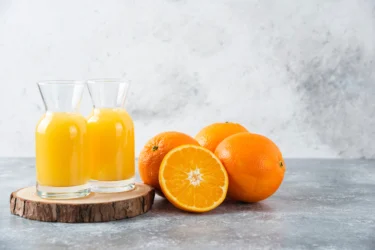
Fruits like oranges, grapefruits, and lemons, and their juices may cause irritation leading to worsening of GERD symptoms in some people.
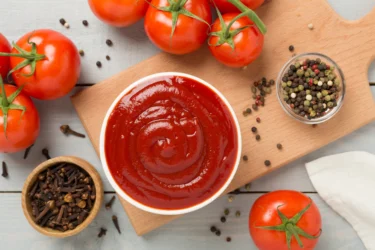
Tomato products like tomato sauce, canned tomatoes and ketchup are highly acidic. So, these can worsen GERD symptoms too.

Caffeine boosts stomach acid levels and may relax the lower oesophageal muscles (LES). This can trigger GERD symptoms. Decaf options or herbal drinks can be helpful instead3,4.

Spicy foods have materials like chili peppers, curry powder, hot sauces etc in them. These all can cause irritation to the oesophagus and fire up stomach acid, causing more heartburn2,3.

High-fat foods can slow digestion and induce acid reflux by relaxing LES. Some examples of high-fat foods to avoid are2,3:
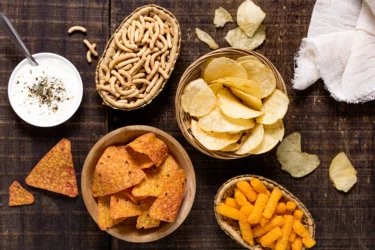
Food items such as chicken chunks, onion rings, and potato chips could make GERD symptoms worse.

High-fat dairy like cream, cheese, butter, and whole milk might worsen GERD symptoms. Try low-fat dairy or other alternatives instead.

Bubbly drinks like soda and sparkling water can exacerbate GERD symptoms. The bubbles push up pressure in the stomach, spurring stomach contents to flow into the oesophagus3.

Alcohol use can worsen GERD symptoms by relaxing the LES which allows acid to reflux into the oesophagus and worsen GERD symptoms. It also delays gastric emptying, and can irritate the gastric mucosa, all of which exacerbate GERD symptoms. Cutting down on alcohol intake is advised when on pantoprazole. If needed, ask your healthcare provider about what safe levels of drinking are while on this medication5.
When on pantoprazole, it’s vital to know about potential drug and nutrient interactions. Always talk with your healthcare provider before starting any new medicines or supplements.
Pantoprazole could interact with certain medications affecting their usefulness or causing unwanted side effects. Let’s see what these are:
Examples and Effects
Always tell your healthcare provider about the medicines you’re currently on. This can help avoid harmful drug interactions.
Like other PPIs, long-term use of pantoprazole could interfere with the absorption of specific nutrients. This might lead to deficiencies. Here are some examples:
Discuss with your healthcare provider any concerns over potential nutrient interactions. Regular blood tests might be needed to monitor nutrient levels for those using pantoprazole long-term.
To boost overall digestive health and help manage GERD symptoms, a Mediterranean diet or low carbohydrate diet is preferred8. These foods can be included in your diet while on pantoprazole:
Foods with a neutral or slightly alkaline pH help strike a balance in stomach acid levels. They alleviate GERD symptoms. Some examples are:
Foods rich in fibre can boost digestion health and help prevent acid reflux. Some high-fibre options are:
Incorporate lean protein sources in your meal plan. These include:
Certain precautions need to be kept in mind while on pantoprazole to assure both safety and effectiveness. Keep the following points in mind:
Stay alert to side effects, both minor and serious ones like diarrhoea, nausea, headaches and allergic reactions. Always inform your healthcare provider of any long-lasting or severe symptoms.
Severe or persistent diarrhoea could signal Clostridioides difficile-associated diarrhoea, a rare but serious complication of long-term PPI use1.
Acute interstitial nephritis (AIN), a condition affecting the kidney, is also a rare but documented adverse effect of PPIs including pantoprazole.
Also Read: Best Summer Foods to Keep Your Body Cool
Correct dosage, duration of treatment and precautionary measures vary as per the specific populations:
Also Read: What To Eat During Food Poisoning?
Knowing which foods and drinks to avoid, how to monitor medicine interactions, and adopting healthy eating habits are essential when on pantoprazole for maximum benefits and safety. Always work together with healthcare providers to get personalized advice and recommendations, ensuring that pantoprazole remains an effective and well-tolerated treatment for your needs.
How long you are on pantoprazole treatment hinges on your specific health problem and how well you respond to therapy. Always stick to the duration of your treatment as advised by your doctor.
Weight gain is not listed as a common side effect in pantoprazole studies. But everyone’s body reacts differently. If you see great changes in your weight, talk to your healthcare provider.
The right pantoprazole dosage varies based on the individual and the condition treated. Always follow your doctor’s advice on dosage.
Take pantoprazole as directed by your doctor. Usually, it is taken once in the morning 45 minutes before breakfast. Do not break, crush, or chew the tablet/capsule as this can impact its effectiveness.
Disclaimer: The information provided here is for educational/awareness purposes only and is not intended to be a substitute for medical treatment by a healthcare professional and should not be relied upon to diagnose or treat any medical condition. The reader should consult a registered medical practitioner to determine the appropriateness of the information and before consuming any medication. PharmEasy does not provide any guarantee or warranty (express or implied) regarding the accuracy, adequacy, completeness, legality, reliability or usefulness of the information; and disclaims any liability arising thereof.
Palm oil is a widely used ingredient found in many everyday products, from food items to household goods. Despite its prevalence, there is often limited awareness about what palm oil is and how it is used.
Derived from the fruit of the oil palm tree, palm oil has become a common component in both edible and non-edible products due to its versatility, long shelf life, and cost-effectiveness. It is used in cooking oils, baked goods, snacks, margarine, cosmetics, soaps, and even cleaning products1.
This article explores the origins of palm oil, its various applications, and its nutritional profile. It also considers the ongoing discussions surrounding its impact on health and the environment. Comparisons with other types of oils will be included to help provide a balanced perspective.
Palm oil is an edible vegetable oil extracted from the fruit of the oil palm tree (Elaeis guineensis). Originally cultivated in the western and southwestern regions of Africa, the oil palm is now grown extensively across tropical regions, particularly in Southeast Asia. Due to its unique fat composition, palm oil has become a key ingredient in a wide variety of products worldwide1.
Palm oil production begins with the harvesting of oil palm fruits. The fruits are then steamed or boiled and mechanically pressed to extract the oil. It’s important to differentiate between palm oil and palm kernel oil, though both are derived from the Elaeis guineensis plant, palm oil comes from the fruit’s fleshy pulp, while palm kernel oil is obtained from the seed inside the fruit. Each oil has a distinct composition and is used in different culinary and industrial applications2.
Crude palm oil has a has a distinctive reddish-orange colour, primarily due to its natural carotene content, which is the same pigments that give carrots and tomatoes their vibrant hues. It also contains tocotrienols, a form of vitamin E. These naturally occurring compounds contribute to the oil’s oxidative stability and are part of its overall nutritional profile2.
Palm oil is available in various forms depending on the degree of processing. The two most common types found in consumer products are unrefined and refined palm oil3.
Palm oil has been the subject of considerable attention in discussions surrounding diet and health, largely due to its relatively high saturated fat content. Saturated fats, when consumed in excess, may influence cholesterol levels, which in turn can have implications for heart health. However, palm oil also contains a number of beneficial nutrients, including certain forms of vitamin E and essential fatty acids, which play important roles in supporting overall health.
It is important to consider the type and processing level of palm oil, as these factors can affect its nutritional properties and best use. Below is an overview of commonly available forms of palm oil, their characteristics, and typical applications:
Ever wondered the many ways palm oil is used in our daily life? Let’s take a look.
Palm oil is a common cooking ingredient thanks to its unique taste and adaptability. It’s particularly good for frying because it can withstand high heat.
Palm oil isn’t limited to the kitchen. It is a key ingredient in a variety of everyday non-food items.
Refined and fractionated palm oil is widely utilised in the food industry due to its distinct functional properties. It demonstrates excellent oxidative stability, which allows it to resist spoilage and maintain quality during storage and processing. Furthermore, palm oil contributes nutritional value by supplying essential nutrients that support bodily functions11.
Dr. Siddharth Gupta, B.A.M.S, M.D (Ayu)
Palm oil is a versatile ingredient that plays a significant role in both food and non-food products. Its functional properties and stability have led to widespread use in households and industries around the world.
Unrefined palm oil is a natural source of carotenoids, which the body can convert into vitamin A. This makes it a potentially useful addition to diets where vitamin A deficiency is a concern. Additionally, palm oil contains tocotrienols, a form of vitamin E that has been studied for its antioxidant properties and potential roles in supporting heart and brain function1.
While research into these effects is ongoing, these nutrients are recognised for their contribution to overall health.
Approximately 50% of palm oil’s fat content consists of saturated fats, particularly palmitic acid2. Diets high in saturated fat have been associated with increased levels of low-density lipoprotein (LDL) cholesterol, often referred to as ‘bad’ cholesterol which may raise the risk of cardiovascular disease.
Palm oil, like all oils, is energy-dense and high in calories. Therefore, portion control and overall dietary balance are essential when including it in regular meals.
The nutritional composition per tablespoon of palm oil is as follows4:
While palm oil is often discussed in the context of its saturated fat content, emerging research suggests it may offer certain potential benefits when consumed in moderation as part of a balanced diet. These areas of interest primarily relate to heart and brain health, though further research is necessary to draw firm conclusions.
Some scientific studies have explored the impact of palm oil on heart health, with mixed but noteworthy findings.
Evidence and Research Studies
Considerations
It’s important to emphasise that such findings are associated with moderate consumption within the context of an overall healthy diet. Palm oil is calorie-dense and high in fat, and excessive intake, like that of any fat, may contribute to weight gain and related health issues. Individual dietary needs, existing medical conditions, and overall lifestyle should be considered when evaluating its suitability7.
Research has indicated potential brain health benefits associated with the vitamin E tocotrienols found in palm oil.
Evidence and Research Studies
Studies8 have suggested that tocotrienols in palm oil can help protect the brain against neurodegenerative diseases. These compounds have been linked to a possible slowing of dementia progression and a reduction in the risk of stroke or the development of brain lesions.
Tocotrienols function as antioxidants, which may protect the brain’s delicate polyunsaturated fats from oxidative damage. This protective effect could contribute to slowing the advancement of dementia, lowering stroke risk, and preventing the growth of brain lesions. It is important to note, however, that larger-scale human trials are required to substantiate these preliminary findings.
While palm oil may offer certain health benefits, it has also attracted considerable debate regarding its potential negative effects on both human health and the environment. Understanding these issues is crucial to forming a balanced perspective on palm oil production and consumption.
Much of the health-related discussion around palm oil focuses on its saturated fat content and the possible implications for cardiovascular health.
There is ongoing scientific debate about the relationship between saturated fat intake, blood cholesterol levels, and heart disease risk. Some studies suggest that palm oil does not adversely affect heart health and may even provide certain benefits when consumed in moderation. Conversely, other research indicates that its relatively high saturated fat content could increase levels of low-density lipoprotein (LDL), often referred to as ‘bad’ cholesterol, which is linked to a higher risk of cardiovascular disease2.
The predominant saturated fat in palm oil, palmitic acid, is considered to have a milder effect on blood cholesterol compared to some other saturated fats. Nonetheless, concerns persist that excessive consumption of palm oil could contribute to elevated cholesterol levels and associated health risks2.
The environmental impact of palm oil production is a significant aspect of the wider discussion.
Large-scale palm oil cultivation, particularly in regions such as Southeast Asia, has been associated with substantial deforestation and the destruction of natural habitats. This expansion threatens the survival of endangered species, including the Bornean orangutan and the Sumatran tiger, among others9.
Beyond environmental damage, the industry has faced criticism for labour exploitation and violations of indigenous peoples’ rights, especially in areas where regulatory oversight is limited.
Cheese replacements or imitation products are often preferred for their cost-effectiveness and nutritional profile. When selecting such alternatives, palm oil has demonstrated potential benefits, including a favourable effect on blood cholesterol levels when used instead of milk fat. This is largely attributed to its content of monounsaturated and polyunsaturated fatty acids. Additionally, the natural tocopherol present in palm oil contributes to the nutritional value of cheese analogues. Thus, incorporating palm oil as a source of dietary fat may be a suitable option11.
Dr. Rajeev Singh, BAMS
Understanding how palm oil compares to other popular oils can provide valuable insight into its role in a balanced diet.
Olive oil is widely recognised for its cardiovascular benefits, primarily because of its high content of monounsaturated fats. Some studies have suggested that palm oil and olive oil may have similar effects on cholesterol levels, despite palm oil’s higher saturated fat content10.
Canola oil contains less saturated fat and more monounsaturated fat than palm oil. It also has a notable proportion of omega-3 fatty acids, which contribute to its reputation as a heart-friendly oil. However, most commercially available canola oil is derived from genetically modified crops, whereas palm oil typically is not10.
Avocado oil is rich in monounsaturated fats and antioxidants, making it one of the healthiest cooking oils available. Similar to palm oil, avocado oil is stable at high temperatures, making both oils suitable for frying and other heat-intensive cooking methods10.
Sunflower oil is known for its high polyunsaturated fat content, especially linoleic acid, which is valued for its potential to lower cholesterol. While its nutritional profile differs from that of palm oil, sunflower oil remains a popular choice for those seeking to manage cholesterol levels10.
Coconut oil, like palm oil, contains a high proportion of saturated fats, particularly lauric acid. Its saturated fat content is generally higher than that of palm oil. Despite this, coconut oil is frequently recommended for its various health effects, although evidence remains mixed and further research is ongoing10.
Assessing palm oil as either beneficial or harmful is a complex issue that depends largely on consumption patterns, including quantity, frequency, and the context of an individual’s overall diet. While palm oil’s high saturated fat content suggests moderation is necessary, it also provides valuable nutrients such as vitamins A and E, which offers practical benefits in cooking due to its heat stability.
However, the environmental challenges associated with palm oil production are significant and must be taken into account. Therefore, if palm oil is to be included in the diet, it should be consumed judiciously, within a balanced and varied nutritional framework. Choosing palm oil that is sustainably sourced can further help reduce its environmental impact, supporting both personal health and ecological responsibility.
The main concern associated with palm oil is its high saturated fat content, which may increase bad cholesterol and heart disease risk. But eating in moderation as part of a balanced diet should not pose major health risks.
Palm oil and olive oil each offer distinct nutritional properties. Olive oil is a source of monounsaturated fats, while palm oil contains natural antioxidants, including vitamin A (as beta-carotene) and vitamin E (tocotrienols and tocopherols). The choice between the two may depend on individual dietary preferences, culinary use, and nutritional considerations.
As with any food, moderation is key. Palm oil contains saturated fats, and the World Health Organization recommends that saturated fat intake should not exceed 10% of total daily calories. When used in small amounts, palm oil can be part of a balanced and varied diet, depending on individual nutritional needs.
There is no conclusive evidence directly linking palm oil consumption to cancer. However, concerns arise from its potential role in a diet high in saturated fats, which may contribute to certain health risks and research on this topic is ongoing.
While palm oil consumption has been associated with elevated levels of LDL cholesterol due to its saturated fat content, the direct link to heart disease remains inconclusive. Moderation in consumption and maintaining a balanced diet are recommended for heart health.
When stored properly in a cool, dark place and sealed tightly, palm oil can have a shelf life of up to a year or more. However, factors such as exposure to heat, light, and air can affect its quality and lead to a shorter storage lifespan.
While rare, some individuals may be allergic to palm oil, experiencing allergic reactions such as skin rashes or gastrointestinal discomfort. However, palm oil allergies are not widespread, and most people can consume it without adverse effects.
Introducing palm oil to babies’ diets is generally not recommended due to its high saturated fat content. Babies need a balanced diet that primarily consists of breast milk or formula, followed by the gradual introduction of age-appropriate solid foods.
Palm oil and palmolein oil are not the same, although both are derived from the palm fruit. Palm oil is in a semi-solid form, while palmolein in the liquid fraction is obtained through a refining process. They have different applications in cooking and food processing.
There is no conclusive evidence that red palm oil directly darkens the skin. While some anecdotal claims suggest potential skin benefits, the impact on skin tone is not well-established, and individual reactions may vary. It’s advisable to consult with a dermatologist for personalised skincare advice.
Disclaimer: The information provided here is for educational/awareness purposes only and is not intended to be a substitute for medical treatment by a healthcare professional and should not be relied upon to diagnose or treat any medical condition. The reader should consult a registered medical practitioner to determine the appropriateness of the information and before consuming any medication. PharmEasy does not provide any guarantee or warranty (express or implied) regarding the accuracy, adequacy, completeness, legality, reliability or usefulness of the information; and disclaims any liability arising thereof.
Discussing the pleasures and health benefits of certain solo endeavours may raise many eyebrows, such as in the case of masturbation and its association with prostate cancer. It is a malignant tumour of the prostate gland and is one of the main causes of death due to cancer in men worldwide. It is the third most common cancer in Indian men and has been linked to risk factors like vasectomy procedures, obesity, diabetes mellitus, and poor BMI1. Men will be glad to know that studies suggest that frequent ejaculation through intercourse or masturbation has health benefits, and lowering the risk of prostate cancer is one of them2. Contrary to popular belief, masturbation, if done in moderation, does not increase the risk of prostate cancer.
Masturbation is a common sexual act that has been misunderstood and seen as taboo by society. It involves self-stimulation of the genitalia to achieve sexual release, orgasm, or ejaculation and feel sexual pleasure. People of all genders and sexual orientations can engage in this private activity. It can be both self or partner-assisted.
The ejaculate in men is essentially semen, which contains a large portion of the seminal fluid, a sperm-nourishing liquid. The prostate gland, which is found in men just below the urinary bladder, is responsible for producing this seminal fluid. Hence, the close link between masturbation and prostate cancer cannot be ignored2.
Regular masturbation can be beneficial for the prostate’s health, which can thereby reduce the risk of prostate cancer. Here are a few benefits of masturbation:
One of the most extensive studies was published in European Urology in 2016, in which over 31,000 males were followed for over 20 years. The researchers concluded that frequent ejaculators (irrespective of masturbation or intercourse) had lower prostate cancer rates than other males4.
The precise reason for the positive relationship between masturbation and prostate cancer is not entirely understood since the cancer of the prostate gland is multifactorial. Studies show prolonged contact between the cells of the prostate gland and their secretions, such as seminal fluid, which contains sufficient levels of zinc, phosphates, citric acid, and the male hormone di-hydrotestosterone (DHT), may accelerate the growth of cancer5. Hence, it may be derived that masturbation reduces the contact between the cells and fluids of the prostate gland. However, this fact has yet to be proven.
There are several factors as mentioned below that affect the risk of developing prostate cancer. While some of these factors are beyond our control, knowing them can still help men make wise choices regarding their health6.
While the research on the specific benefits of masturbation for prostate health is still developing, several studies have been conducted to provide an overview of the psychological and physiological health advantages of masturbation and other sexual behaviours that cause ejaculation in men5,7.
The following are a few potential advantages of masturbation for prostate health:
Masturbation and prostate cancer have an intricate relationship. As explained, prostate cancer risk can be decreased by ejaculations through sexual acts like masturbation5,7.
Masturbation involves external genital stimulation, which indirectly affects the prostate gland. This stimulation may keep the gland active, induce the healthy formation of seminal fluid, and drain the fluid periodically. All of these processes are natural and necessary to maintain the health of a secretory gland5,7.
Sexual activity, including masturbation, improves blood flow to the genital area. An increase in blood flow can help the prostate gland function optimally by supplying it with oxygen and other vital nutrients5,7.
Masturbation is a private, intimate, fulfilling, and pleasurable sexual activity that can help people unwind and reduce stress. Prostate difficulties and other health problems have been related to chronic stress. Masturbation may indirectly improve prostate health by lowering stress levels5,7.
Masturbation gives people a chance to know their bodies, sexual preferences, and reactions. Understanding sexual desires and pleasure can help with sexual self-awareness. Accepting your own sexuality and engaging in sexual behaviours that are pleasurable and satisfying, can both be beneficial for your sexual well-being5,7.
Studies suggest that infrequent ejaculation can improve sperm count and volume, while frequent ejaculation can often enhance sperm quality, morphology, and DNA fragmentation (breakages and patterns in the genetic material of the sperm)8.
Following an orgasm, your body releases oxytocin, a stress-reducing hormone, and blocks cortisol, a stress-inducing hormone. Research9 says that orgasms shorten the time it takes to fall asleep and enhance the quality of sleep.
Also Read: How Exercise Can Help You Deal with Breast Cancer
The inverse relationship between masturbation and prostate cancer clearly requires more scientific studies. In a country like India, it is still difficult for physicians to record a detailed history of self-stimulation or masturbation. There is a long way to go before doctors start prescribing ‘masturbation’ for better sexual health. The majority of factors that increase the chances of prostrate cancer, such as age and family history of the illness, are unchangeable. Hence, if there exists a natural and pleasurable way of reducing the risks of prostate cancer, then why not try it?
Also Read: Is Daily Sex Good for Health?
The frequency of ejaculations varies greatly from person to person and is affected by factors like age, health, and sexual choices. There is no set quota or suggested frequency for ejaculation. However, excessive acts of masturbation could be bad.
An infection or inflammation of the prostate gland, known as prostatitis, is caused by bacteria or other elements. In some people, excessive intercourse, including many ejaculations, may cause momentary pain or annoyance in the prostate or pelvic region. A proposed reason for the symptoms of chronic Prostatitis/Chronic pelvic pain syndrome is frequent ejaculation-associated free radical and lactic acid accumulation, which results in noninfectious inflammation and muscle weakness, not prostatitis10.
Age, sedentary lifestyle, chronic stress, and processed food/ red meat are a few aggravating factors in prostate cancer. If you have a family history of prostate cancer, it is best that you stay away from these.
Maintain a healthy weight, avoid processed foods with preservatives, hydrate yourself better, exercise regularly and avoid self-medicating with hormonal supplements that may derange the levels of testosterone to keep your prostate healthy
-Difficulty in the start of urination
-An interrupted flow of urine
-The desire to urinate multiple times, especially at night
-Pain while urinating
-Mild specks of blood in the urine and the semen
Disclaimer: The information provided here is for educational/awareness purposes only and is not intended to be a substitute for medical treatment by a healthcare professional and should not be relied upon to diagnose or treat any medical condition. The reader should consult a registered medical practitioner to determine the appropriateness of the information and before consuming any medication. PharmEasy does not provide any guarantee or warranty (express or implied) regarding the accuracy, adequacy, completeness, legality, reliability or usefulness of the information; and disclaims any liability arising thereof.
Cancer appears as a solid tumor (lump) that is malignant1. Penile cancer is a cancer of the penis (the external part of the male urinary and reproductive system). The cells present in the tissues of the penis give rise to different types of penile cancer.
Depending upon the type of cell affected in the penis, the type of penile cancer is determined. Following are the type of penile cancers: Squamous cell cancer, Melanoma, Basal cell cancer, Adenocarcinoma (Paget’s disease of the penis), and Sarcoma2. Penile cancers can start in any part of the penis.
Most commonly it has been found to begin on the head or foreskin of the penis. This cancer goes untreated in many individuals since it is associated with psychological distress. Males suffering from this type of cancer often delay seeking medical opinion because they fear and suffer embarrassment4 . Males who are over 55 years are most often detected with penile cancer. However, people who are under the age of 40 can also develop this type of cancer.
Did you know?
Irrespective of the type of penile cancer, mostly the foreskin and the tip of the penis (glans) get affected. Therefore, penile cancer symptoms are first visible on this part of the penis5.
Signs of penile cancer are listed as under:
The following are the symptoms of penile cancer:
Penile cancer is a rare form of cancer that starts in the tissues of the penis. The exact cause of penile cancer is not clear, but several factors have been identified that may increase the risk of developing this type of cancer:
Risk factors are not the factors causing penile cancer but these factors increase the chance of occurrence of developing penile cancer. Below are some of the risk factors3:
Upon visiting the doctor following diagnostic protocols are carried out to understand the developing penile cancer in an individual. The mean age of diagnosis of penile cancer is at the age of 60 years4.
Treatment strategy for penile cancer depends on the size of the tumour, cancer stage, spread of the cancer, and its likelihood of relapsing after the treatment3. Often, treatment options are combined to have maximum therapeutic effect, following is a list of treatments that might be employed for treating penile cancer:
In my experience, a healthy skin cell may become a cancer cell when you have penile cancer. Uncontrolled cancer cell growth results in the formation of a tumour that pushes the healthy cells aside. As time passes, cancer cells have the potential to invade further organs and tissues in your body. I strongly recommend routine complete body checkups for those who have a family history of cancer3.
Dr. Rajeev Singh, BAMS
Following are the possible preventive measures7:
Penile cancer complications are like any complication that arises due to surgical incidents such as:
Did you know squamous cell carcinoma (SCC) makes up 95% of penile cancer cases? This type of cancer develops in the epithelium that is the top layer of your skin. Different types of tissues may develop other forms of penile cancer: basal cell carcinoma (BCC), melanoma, and sarcoma. Out of these, the malignancy melanoma is more dangerous3.
Dr. Siddharth Gupta, B.A.M.S M.D (Ayu)
One should visit the doctor if the following conditions are observed. As a regular practice, one should look for the mentioned changes that occur in and around the penis:
Also Read: How Exercise Can Help You Deal with Breast Cancer
Penile cancer, though rare, is a serious condition that requires timely recognition and treatment. The stigma, fear, and lack of awareness surrounding male reproductive health often lead to delayed diagnoses, affecting outcomes. Understanding the symptoms, risk factors, and causes, especially the role of HPV and poor hygiene can empower men to take preventive steps early on.
Fortunately, with advancements in diagnostics and treatment, many cases can be managed effectively when detected in time. Maintaining proper genital hygiene, avoiding tobacco, practicing safe sex, and not ignoring unusual symptoms are key pillars of prevention. If you notice any persistent changes in or around the penis, do not hesitate to consult a doctor. Early action can make a significant difference, not just in treatment success but also in overall well-being and quality of life.
Also Read: Jaundice: Symptoms, Treatment, Causes and Types
As soon as your doctor confirms penile cancer, treatment strategies should be discussed with the doctor.
Most men can typically have an erection and continue their sexual life normally after the cancerous area has been removed (wide local excision)9. Most men can typically have an erection and continue their sexual life normally after the cancerous area has been removed (wide local excision)9.
Penile tissue is kept alive during many cancer therapies. This means that your penis finally recovers to resemble its pre-treatment appearance almost exactly. You’re still able to urinate when standing10.
A surgical oncologist, a urologist who focuses on urinary tract issues, a medical oncologist, and a radiation oncologist are frequently on a penile cancer team.
This occurs often 7 to 14 days following your operation11.
Disclaimer: The information provided here is for educational/awareness purposes only and is not intended to be a substitute for medical treatment by a healthcare professional and should not be relied upon to diagnose or treat any medical condition. The reader should consult a registered medical practitioner to determine the appropriateness of the information and before consuming any medication. PharmEasy does not provide any guarantee or warranty (express or implied) regarding the accuracy, adequacy, completeness, legality, reliability or usefulness of the information; and disclaims any liability arising thereof.
Kayam churna is an Ayurvedic preparation readily available at a chemist’s store. A lot of Indians use kayam churna for various stomach-related problems. In the Indian traditional medicine systems such as Ayurveda, Siddha, Unani and Naturopathy, the use of ‘churnas’ has been recorded. Ayurveda defines churna as a fine powder of one or more ingredients in dried form. Kayam churna is an Ayurvedic formulation. It is a balanced blend of seven incredible Ayurvedic ingredients, namely Senna leaves, Mulethi, Ajwain, Black salt, Nishoth, Haritaki and Svarjikshara. Senna leaves (Cassia angustifolia) are the major ingredient of kyama churna. Kayam churna may work against a vast array of stomach disorders like diarrhoea, heartburn, constipation, gas, peptic ulcer and acid-reflux disease1. Let us discuss the health benefits of kayam churna, its nutritional composition, properties, uses and more.
Kayam churna may contain the following ingredients:
The bioactive compounds may include tannins, glycosides, flavonoids, alkaloids, steroids, saponins, and phlobatotannins1.
Kayam churna may have the following properties1:
The potential uses of kayam churna may be described as follows:
Kayam churna powder may provide instant relief from constipation. As per a study1 done by Gupta et al. in 2022, the main ingredient of kayam churna is senna leaves. It may play a major role in correcting bowel movements. Kayam churna contains seven herbs, making it one of the most potent natural preparations for constipation. It may increase muscular movement in the stomach, making the food move faster through the intestine. This may ease constipation and may help ease bowel emptying2. However, if you suffer from constipation, consult a qualified doctor and do not self-medicate.
It is not uncommon to complain about gas in the stomach, which may lead to a painful bloating sensation. All the ingredients of kayam churna may help combat gas formation and relieve bloating. Senna leaves contain anthraquinones, which may have anti-bacterial activity and help remove harmful bacteria from the stomach and increase good bacteria. This may lead to a healthy environment in the stomach and alleviate discomforts such as gas and bloating2. However, more studies on humans are needed to suggest the uses of kayam churna for gas and bloating. Therefore, if you have any such stomach issues, consult with your physician and only use it if advised.
Kayam churna is a herbal preparation containing mulethi, ajwain and senna leaves. It may act as a dietary supplement for various digestive problems. It may help boost the functions of the digestive system. It may help break down the food in the stomach and help it to get digested so that all the nutrients get absorbed into the body. It may also help with indigestion1. However, this information is insufficient; more human studies are needed to support the benefits of kayam churna in digestion.
Jaundice may be caused due to increased bilirubin levels in the liver. Ayurveda has been advising the use of dried senna leaves for managing jaundice. Senna leaves are the main ingredient of kayam churna, which may help regulate pitta production in the liver. It may act as a stimulant, which may help remove pitta from the body. Hence, regular intake of kayam churna ingredients might help avoid the occurrence of jaundice2. However, more human studies are required to support the use of kayam churna for jaundice. If you have jaundice, take medical treatment and do not self-medicate.
Though studies show the potential uses of kayam churna in health conditions, these are insufficient, and there is a need for further studies to develop the scope of the benefits of kayam churna on human health.
You may use kayam churna:
You should consult a qualified doctor before using kayam churna in large quantities. Do not discontinue or replace an ongoing modern medical treatment with an ayurvedic/herbal preparation of kayam churna without consulting an Ayurvedic doctor. They will guide you with its form and dosage per your health condition.
Kayam churna in minimum amounts is considered safe. No major study reports the kayam churna side effects. However, the individual ingredient, if used alone in larger quantities, may have side effects as mentioned below:
If any side effects are seen after using kayam churna, immediately consult your doctor and get proper treatment.
Taking kayam churna in small quantities may be safe. However, the following precautions are necessary:
No study reports the interaction of kayam churna with other medicines. Therefore, more human studies are needed to study the safe use of kayam churna in humans. Consult an Ayurvedic doctor; they will guide you to a safe way to use it.
No. Kayam churna should not be used by lactating mothers. It may induce purgation (involuntary emptying of the bowel) in infants4.
Kayam churna may relieve constipation, act as a laxative, enhance digestion, relieve bloating, reduce flatulence, peptic ulcers and acid reflux1,3.
Kayam churna contains mulethi (licorice root). A heavy dosage of mulethi during pregnancy may cause premature birth and other health problems in the baby. Therefore, pregnant women should avoid kayam churna4.
Disclaimer: The information provided here is for educational/awareness purposes only and is not intended to be a substitute for medical treatment by a healthcare professional and should not be relied upon to diagnose or treat any medical condition. The reader should consult a registered medical practitioner to determine the appropriateness of the information and before consuming any medication. PharmEasy does not provide any guarantee or warranty (express or implied) regarding the accuracy, adequacy, completeness, legality, reliability or usefulness of the information; and disclaims any liability arising thereof.
According to Balinese mythology, a divine bird was sent to Earth carrying four seeds coloured red, white, black, and yellow. During its journey, the bird consumed the yellow seed, leaving only the red, white, and black ones. These are believed to represent the various types of rice grains known today.
Among them, red rice stands out for its distinctive colour and traditional significance. Commonly referred to by different names such as Oryza longistaminata, Matta rice, Palakkadan Matta rice, and Rakthashali in Ayurveda, red rice owes its rich hue to the presence of anthocyanin, a natural antioxidant pigment.
Red rice can appear in several forms, which include wild, weedy, or cultivated and may be partially or fully covered with husk. It has been traditionally cultivated in regions such as Sri Lanka, China, the United States, Korea, and India. Within India, red rice is grown in various states, including Karnataka, Tamil Nadu, Kerala, Odisha, and Madhya Pradesh. Notable varieties include Patni from Maharashtra, Matali and Jatu from Kullu, and Matta from Kerala1.
Did You know?
Red rice is a nutritional powerhouse. It contains proteins, carbohydrates, mono-unsaturated fatty acids, vitamins, and minerals like zinc and iron. Additionally, red rice is a source of polyphenols, including vanillic acid and ferulic acid, as well as antioxidants like anthocyanins, proanthocyanidins, and flavonoids, which are responsible for its characteristic colour. The nutritional components of red rice per 100 grams are given below2:
Scientific studies have examined various aspects of red rice, and its consumption has been associated with several beneficial nutritional properties. Some of these observed characteristics are outlined below, based on available research and traditional dietary usage.
Some of the potential benefits of red rice are described as below:
Inflammation is the body’s natural defence mechanism in response to infection, stress, or tissue injury. It can be acute, such as in the case of fever, or chronic, as seen in long-term conditions like arthritis. A systematic review12 has reported that red rice may exhibit anti-inflammatory and antioxidant properties in certain experimental settings. Antioxidants are known to help protect cells from oxidative stress and may assist in reducing inflammatory responses. These potential effects are attributed to the presence of naturally occurring compounds in red rice, such as gamma-oryzanol, flavonoids, and phenolic compounds3.
While such findings are of interest, it is important to note that more robust scientific studies are needed to confirm these observations. At present, there is insufficient clinical evidence to support any definitive health claims regarding the management or treatment of inflammatory conditions through the consumption of red rice.
Breast cancer is one of the most commonly diagnosed cancers affecting women worldwide. Some preliminary research13 has investigated the potential effects of red rice on breast cancer cells in laboratory settings. Findings from these studies suggest that certain compounds present in red rice, such as polyphenols, particularly proanthocyanidins may influence cellular processes related to cancer progression. For example, red rice extracts have been observed to inhibit the activity of interleukin-6 (IL-6), a protein associated with cell growth and may also play a role in reducing cell migration in vitro4.
However, it is important to emphasise that these studies are experimental in nature, and the results have not been confirmed through large-scale clinical trials. At this stage, there is no conclusive evidence to support any preventive or therapeutic claims related to breast cancer, and further research is required. Individuals should consult with qualified healthcare professionals for medical advice or treatment..
Alopecia is the loss of hair or baldness. Red rice is naturally rich in protein and other nutrients, which are important for general health, including the maintenance of hair. Some experimental research5 has explored the potential impact of red rice on hair health. In one such study, red rice extract was found to inhibit the activity of the enzyme 5-alpha reductase, which is associated with hair loss in certain conditions. These findings suggest a possible link between compounds found in red rice and reduced hair shedding in laboratory models. However, these results are preliminary and have not been confirmed through extensive human studies. At present, there is insufficient scientific evidence to support the use of red rice in managing alopecia, and individuals experiencing hair loss are advised to seek guidance from a qualified medical professional.
Type 2 diabetes is characterised by elevated blood glucose levels either due to a decreased insulin level or resistance of the body to insulin (a hormone that regulates blood glucose levels). A study6 in 2020 investigated the potential effects of red rice in a diabetic mouse model. The findings suggested that red rice consumption may be associated with improved insulin sensitivity and a lower glycaemic response in that experimental context. These observations were attributed to the naturally low glycaemic index of red rice and the presence of certain bioactive compounds. While these results are scientifically noteworthy,
it is important to recognise that the study was conducted on animals, and further well-designed clinical trials in humans are necessary to confirm these outcomes. At present, there is not enough evidence to support any definitive health claims regarding the management of Type 2 diabetes through red rice consumption. Individuals with diabetes should consult a qualified healthcare provider for appropriate dietary and medical guidance.
Dyslipidemia is characterised by elevated cholesterol, including increased low-density lipoprotein, often referred to as ‘bad’ cholesterol, and decreased high-density lipoprotein (HDL), known as ‘good’ cholesterol. A review of existing research7 has noted that red yeast rice, which is a fermented form of red rice, may help reduce cholesterol levels by inhibiting its synthesis in the body.
Additionally, the presence of naturally occurring phytosterols and monounsaturated fatty acids in red rice has been associated with potential benefits in managing lipid profiles. These findings suggest that red rice might have a positive effect on dyslipidemia8. However, further rigorous studies are required to establish these claims with greater scientific certainty.
Literature indicates that diets rich in dietary fibre are generally associated with a reduced intake of fats and may contribute to improved digestive health. Traditional Chinese medicine has historically used red rice as a natural help for digestion8. As a good source of dietary fibre, red rice may support regular bowel movements and provide relief from constipation. Furthermore, red rice is naturally low in fat while being relatively high in protein and fibre, which can promote feelings of fullness, potentially reducing overeating and supporting metabolic health. These characteristics suggest that consuming red rice could be beneficial for digestion, relief from constipation, and maintaining a healthy weight1. However, further scientific studies are needed to confirm these effects.
Though there are studies that show the benefits of red rice in various conditions, these are insufficient and there is a need for further studies to establish the true extent of the benefits of red rice on human health.
As red rice is a good source of many nutrients, including phytochemicals, which are believed to possess properties that may support skin health and potentially contribute to anti-ageing effects15.
Dr. Rajeev Singh, BAMS
You must consult a qualified doctor before taking any herbal supplements. Do not discontinue or replace an ongoing treatment of modern medicine with an ayurvedic/herbal preparation without consulting a qualified doctor.
Few side effects related to the consumption of red rice include:
However, if you experience any adverse reactions to red rice, it is advised to discontinue its use immediately and consult a doctor or the Ayurvedic physician who prescribed it. They can provide appropriate guidance based on your symptoms.”
Certain studies14 have explored the potential of red yeast rice in supporting bone health. Preliminary findings from these studies suggest that red yeast rice may have a role in promoting bone formation.
Dr. Siddharth Gupta, B.A.M.S, M.D (Ayu)
Eating red rice is okay if taken in moderate amounts. However, general precautions must be followed in the following conditions:
Also Read: Plums (Aloo Bukhara): Uses, Benefits, Side Effects & More!
Therefore, you must always seek the advice of your Ayurvedic physician about the possible interaction of red rice with other drugs and follow the prescription thoroughly, as they will know your health condition and other medications you are taking.
Red rice is a nutrient-rich grain with potential health benefits supported by both traditional knowledge and preliminary scientific studies. While promising, its therapeutic claims require more clinical evidence for confirmation. As with any supplement, it should be consumed with caution and professional guidance.
Yes. In comparison with white rice, red rice is rich in zinc and iron which may offer several health benefits.
Some famous red rice varieties include Patni of Maharashtra, Matali and Jatu of Kullu, and Matta of Kerala.
Yes. Red rice is low in fat and high in protein and fibres, which increases satiety and reduces overeating, which may help in weight loss.
If red rice is fermented consumed improperly, it may be associated with a risk of liver injury. Excessive intake of red rice can lead to digestive discomfort, including indigestion, bloating, and stomach pain, primarily due to its high fibre and protein content. While red rice consumption is generally not known to cause allergic reactions, in some cases, it may be linked to symptoms such as itching, rashes, or swelling. The precise causes and mechanisms underlying these reactions are not yet fully understood.
Disclaimer: The information provided here is for educational/awareness purposes only and is not intended to be a substitute for medical treatment by a healthcare professional and should not be relied upon to diagnose or treat any medical condition. The reader should consult a registered medical practitioner to determine the appropriateness of the information and before consuming any medication. PharmEasy does not provide any guarantee or warranty (express or implied) regarding the accuracy, adequacy, completeness, legality, reliability or usefulness of the information; and disclaims any liability arising thereof.
Halim seeds, also known as garden cress seeds, are tiny reddish-brown seeds packed with nutrition and health benefits. Used for centuries in traditional medicine and cooking, they have been valued for their medicinal properties and rich nutrient profile.
These seeds come from Lepidium sativum, an edible herb belonging to the Brassicaceae family. Originally native to Egypt, the plant is now cultivated worldwide, including in India, where it is primarily grown in Madhya Pradesh, Gujarat, Rajasthan, and Uttar Pradesh. The plant produces light pink or white flowers and tiny seed pods, which are harvested for their seeds.
Halim seeds are also known by different names across regions, such as Holan, Chandrasura, Aliv seeds, and garden cress. With their impressive nutritional value, they have gained popularity as a superfood. Let’s explore the numerous health benefits these tiny seeds have to offer1.
Halim seeds are packed with the goodness of carbohydrates, proteins, fibers and minerals like calcium, phosphorus, zinc, etc. and phytochemicals like flavonoids, phenols, lectins, tannins, glycosides, etc. The nutritional components and bioactive components of Halim seeds are mentioned below:
Scientifically proven properties of Halim seeds include:
Based on my experience, I have found that the extract from halim seeds shows promising potential as an antifungal agent. It has been observed to effectively inhibit the growth of various fungal species. Halim seeds may possess strong antifungal properties, which could be beneficial in the management of fungal infections.
Dr. Siddharth Gupta, B.A.M.S, M.D (Ayu)
Some of the potential benefits of Halim seeds are described below:
Type 2 diabetes is a metabolic disorder characterised by hyperglycemia (an increase in blood glucose levels) with reduced or total loss of insulin (a hormone that regulates blood glucose in the body) function.
Qusti et al. conducted a study4 in 2016 to assess the effects of Halim seeds in diabetic rats. The study showed that Halim seeds showed a significant decrease in blood glucose levels. This effect was attributed to the inhibition of molecules which inhibit the insulin pathway. This indicates that Halim seeds may help in managing diabetes. However, we need more studies to support these claims in humans.
Strong bones reduce the risk of fractures and protect vital organs like the brain and heart from damage. To build strong bones and promote bone healing in fractures, calcium and Vitamin D play an important role.
Dixit et al. conducted a study1 on rats in 2020, stating that Halim seeds may positively impact bone health and help promote bone healing in case of fractures due to the presence of calcium and phosphorus in high amounts. This indicates that Halim seed consumption may have a positive impact on bone fractures, provided more human studies are done to support these claims.
Obesity is defined as an excessive or abnormal accumulation of fat in the body. A Body Mass Index (BMI)>25 kg/m2 is defined as overweight, and >30 kg/m2 is considered obese. Reducing body weight may help in managing obesity.
Dixit et al. conducted a study4 in 2020 to assess the effect of Halim seeds on obese rats; the study findings supported the use of Halim seeds for weight loss. This indicates that Halim seed consumption may help manage obesity by reducing weight. However, we need more studies to support these claims in humans.
Breast cancer is one of the most common cancers affecting women worldwide. Literature reviews support the use of dietary agents and a reduced risk of breast cancer.
Mahassni et al. conducted a literature review5 in 2013, stating Halim seeds contain phytochemicals like organo-sulfur compounds and phytosterols, which have antioxidant and anti-inflammatory effects and may inhibit cell multiplication, arrest the cancer cell cycle and cause apoptosis (cell death of cancer cells). This indicates that Halim seeds may exert an anti-cancer effect on breast cancer. However, there is limited evidence, and we need more studies to support these claims in humans.
Hyperlipidemia or hyperlipoproteinemia is defined as an increase in total cholesterol, a reduction in low-density lipoprotein or bad cholesterol and an increase in high-density lipoprotein or good cholesterol.
Yousef et al. conducted a study6 in 2014 to assess the effects of Halim seeds on hyperlipidemia; this study states that Halim seeds positively impacted lipid profiles. This effect is attributed to the inhibition of an enzyme, which aids the formation of cholesterol. This indicates that the consumption of Halim seeds may help manage hyperlipidemia. However, more studies should be conducted to claim these effects with more reliability.
In my practice, I have observed that halim seeds may exhibit significant antidiarrheal properties. It is believed to achieve this by inhibiting gastrointestinal propulsion and fluid secretion, resulting in a decreased frequency of bowel movements and reduced fluid loss.
Dr. Rajeev Singh, BAMS
Though there are studies that show the benefits of Halim seeds in various conditions, these are insufficient, and there is a need for further studies to establish the true extent of the benefits of Halim seeds on human health.
You must consult a qualified doctor before taking any herbal supplements. Do not discontinue or replace an ongoing treatment of modern medicine with an Ayurvedic/herbal preparation without consulting a qualified doctor.
According to a study9, it is stated that in addition to the nutritional components, Halim seeds also contain anti-nutrients like phytates and oxalates, which may interfere with the absorption of nutrients.
However, if you experience any adverse reactions to Halim seeds, it is advised to discontinue their intake and immediately contact a doctor or your Ayurvedic physician who has prescribed them. They will be able to guide you appropriately.
Consuming Halim seeds is okay if taken in moderate amounts. However, general precautions must be followed in the following conditions8:
The safety data regarding the use of Halim seeds in pregnant and breastfeeding women, the elderly and infants is limited; therefore, it is advised to take necessary cautions if you plan to add this herb to your dietary routine. It is advised to follow precautions and consume it in moderate amounts.
Consuming Halim seeds is contraindicated in the following situations:
Also Read: 14 Amazing Health Benefits of Pumpkin Seeds!
However, you must always seek the advice of your Ayurvedic physician about the possible interaction of Halim seeds with other drugs and follow the prescription thoroughly, as they will know your health condition and other medications you are taking8.
Also Read: Chia Seeds: Uses, Benefits, Side Effects, and More!
Yes, animal studies3 show that Halim seeds may help in weight loss. However, we need more studies to support these claims in humans. Therefore, it is advised to consult a doctor for proper treatment in case you have any weight-related issues.
The safety data regarding the use of Halim seeds in pregnancy is limited; therefore, it is advised to take necessary cautions if you plan to add this herb to your dietary routine. It is advised to consult a doctor for proper advice.
Yes, Halim seeds, due to their high iron content, may help in managing iron-deficiency anemia.
Disclaimer: The information provided here is for educational/awareness purposes only and is not intended to be a substitute for medical treatment by a healthcare professional and should not be relied upon to diagnose or treat any medical condition. The reader should consult a registered medical practitioner to determine the appropriateness of the information and before consuming any medication. PharmEasy does not provide any guarantee or warranty (express or implied) regarding the accuracy, adequacy, completeness, legality, reliability or usefulness of the information; and disclaims any liability arising thereof.
Breast cancer is one of the most common cancers in women. It may also occur in men, although very rare. Breast cancers can start from any of the different parts of the breast1. The breast is an organ composed mainly of glands, ducts and fatty tissue. In women, the breast makes milk for feeding newborns and infants.
The most common types of breast cancer are2:-
The cancer cells begin in the ducts and then grow outside the ducts into other parts of the breast tissue. Invasive cancer cells can also spread or metastasise, to other parts of the body.
The cancer cells begin in the lobules and then spread from the lobules to the breast tissues that are close by. These invasive cancer cells can also spread to other parts of the body.
There are other types of breast cancers as well, which a doctor usually diagnoses with the help of lab tests and biopsies.
Breast cancer must not be left untreated once diagnosed. The treatment for breast cancer comprises surgery, chemotherapy and radiation therapy. Proper diet and food supplements help in combating and overcoming, partially or otherwise, the side effects of the treatment cycle, especially chemotherapy and radiation.
Good nutrition is the key for cancer patients throughout the various phases of treatment and after. The treatment may affect the way your body metabolises certain foods and uses nutrients and this varies for each individual.
During the treatment process, your diet must help build up your strength. You must eat high protein, high-calorie foods which will promote the following-

If you had surgery, chemotherapy or radiation therapy, you need a lot of protein to feel fit and fight off infections. The body loses substantial immunity in the process of breast cancer (and other cancer) treatment. Fish, poultry, lean meat, eggs, low-fat dairy products, nuts and nut butter, dried beans, peas, lentils and soya foods are all good sources of protein.
In my opinion, depending on whether you are vegeterian or follow other diets, increase your consumption of poultry, fish, and legumes like beans and lentils for a healthy source of protein. Scientists suggest daily protein consumption may help cope with breast cancer3. One to two servings of soy food per day, such as tofu, edamame, and soy milk, may also be included assuming soy is used in moderation.
Dr. Rajeev Singh, BAMS

Grapes are a rich source of the antioxidant resveratrol, which has the potential to possibly stop cancer from starting in the breast4. You must eat grapes with their skin intact as it has the most resveratrol.
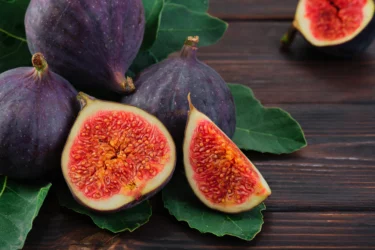
These have always been popular for their medicinal properties. They contain high levels of the flavonoid quercetin beneficial for lung and colon cancers5. Figs can reduce inflammation which is the major cause of cancer.
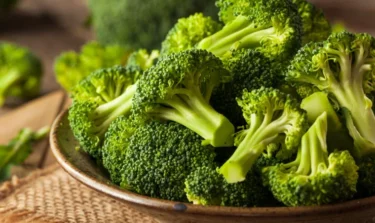
Cruciferous vegetables must be included in your regular diet. Broccoli has a high amount of a phytochemical called sulforaphane, which is a cancer-fighting plant compound6. These vegetables are effective sources of nutrition and also boost immunity.
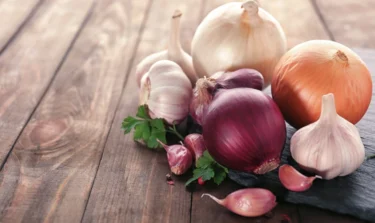
The antimicrobial and antitumor properties of garlic and onion have been known for over 1000 years. They must be part of your daily diet.

Tea (both green and black) has active antioxidants that keep the harmful effects of free radicals in check, which cause cellular damage7. Fresh tulsi tea can be a good choice.
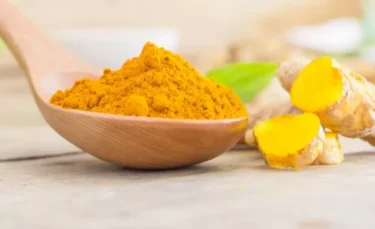
It is already an integral part of Indian foods. Curcumin I, II and III inhibit carcinogenesis and have proven anti-inflammatory properties. It is also an antitumour agent8.
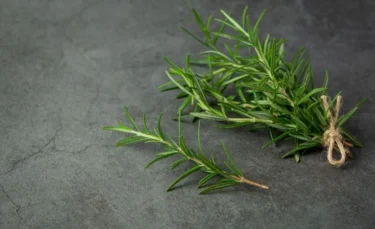
This herb is rich in carnosol, a phytochemical that can slow the growth of cancer cells, strengthen the immune system and limit the production of cancer-related hormones. It acts as an antioxidant and can be included in your diet during and after breast cancer treatment9.
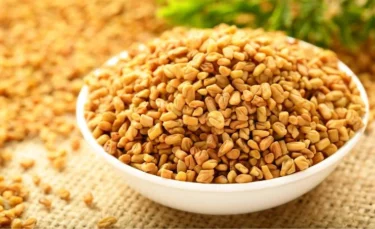
This ingredient in every Indian kitchen helps inhibit tumour cell growth. It is useful for patients with breast cancer and it has anticancer potential10. You may include it in your diet during and post-treatment.

This exotic flower product has excellent inhibitory properties against cancer cells11.
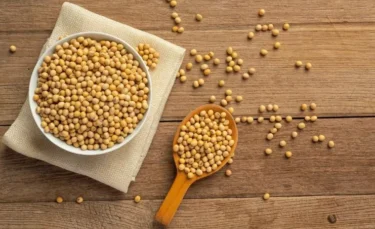
Nutritional properties of soya milk and other soya products make them preferred inclusions in your breast cancer diet.
If you ask me, roughly 25 to 30 grams of fibre should be taken daily. To my knowledge, whole grains are rich in vitamins, minerals, phytochemicals, fibre, and complex carbs. According to a study12, eating a lot of fibre may keep you away from breast cancer and other hormone-dependent tumours. Make sure that at least 50% of the grains in your diet are whole grains, such as brown rice for dinner or whole-grain bread for lunch.
Dr. Siddharth Gupta, B.A.M.S, M.D (Ayu)
Also Read: Jaundice: Symptoms, Treatment, Causes and Types
Apart from the usual culprits like sugary foods, fatty foods and processed and preserved food, if you suffer from breast cancer, make sure you avoid the following:
Also Read: How Exercise Can Help You Deal with Breast Cancer
The most important part of breast cancer treatment is a regular follow-up, maintaining a healthy lifestyle and following a good diet. Apart from keeping to a diet rich in proteins, minerals, vitamins and nutrients, you must always be well hydrated. Drink plenty of water, exercise and keep your weight in check, as fat and obesity are inimical for breast cancer. Form a habit of taking small meals rather than heavy ones, spaced throughout the day. Do enough activities caring to avoid stress on the arm where the axillary nodes have been surgically removed.
Also Read: Best Summer Foods to Keep Your Body Cool
Your diet should be such that you eat enough nutrients to keep your body strong. A balanced diet consisting of fruits, vegetables, grains, beans, nuts, seeds, meats/eggs and dairy products is ideal. Talk to your doctor about any additional supplements that you may need.
Cruciferous vegetable-based juices, i.e. juices that contain vegetables like cabbage, spinach or any other belonging to the family of cruciferous vegetables containing loads of vitamin A.
You may go for any of these juice combinations:
– Orange, carrot, turmeric.
– Green apple, beetroot.
– Beetroot, carrot orange, cucumber.
Make sure to consume freshly prepared juices and not packaged ones. Whole fruits are always better than juices because they include all the fibre content.
Eggs are rich in powerful antioxidants, lutein and zeaxanthin. It inhibits cancer cell growth in breast cancers. It is good to have an egg a day unless you suffer from any other health conditions and must avoid it.
Berries, broccoli, tomatoes, walnuts, grapes and other coloured and leafy vegetables, fruits and nuts from the list. All plant foods that contain phytochemicals typically comprise foods for fighting your battle against breast cancer naturally.
Disclaimer: The information provided here is for educational/awareness purposes only and is not intended to be a substitute for medical treatment by a healthcare professional and should not be relied upon to diagnose or treat any medical condition. The reader should consult a registered medical practitioner to determine the appropriateness of the information and before consuming any medication. PharmEasy does not provide any guarantee or warranty (express or implied) regarding the accuracy, adequacy, completeness, legality, reliability or usefulness of the information; and disclaims any liability arising thereof.
Next Page »